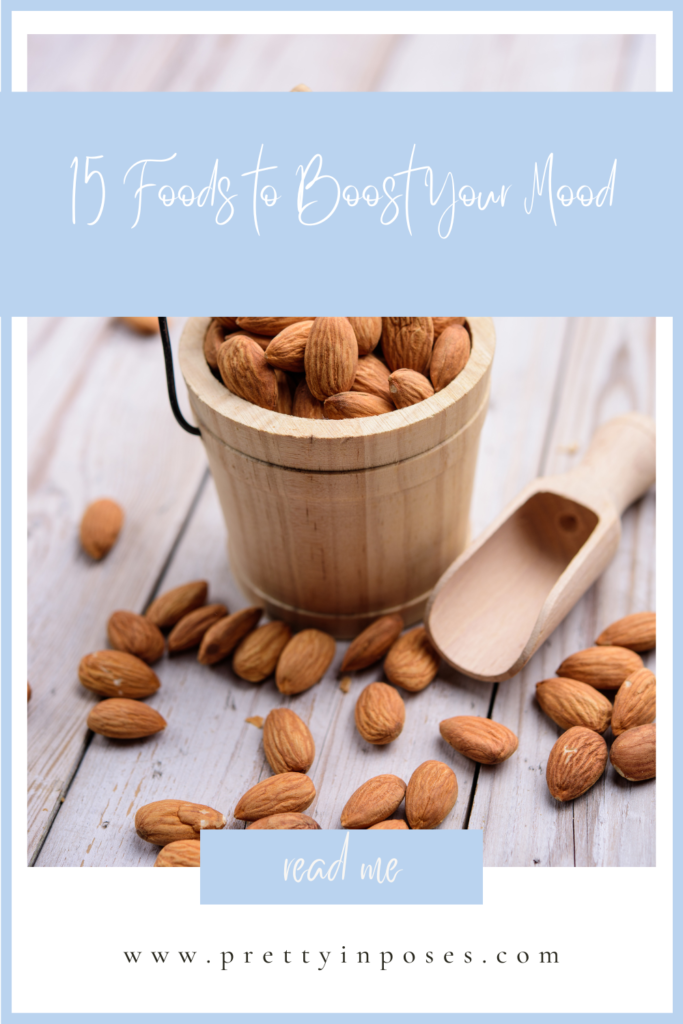This post lists 15 foods to boost your mood.
The path to happiness and well-being starts with a healthy mindset.
But sometimes life gets in the way and it becomes harder to make this a priority.
Luckily, there are simple things you can do daily to help improve your mental state such as switching up your diet.
In this post, we’ll discuss 15 foods you can enjoy right now to boost your mood.
How Food Affects the Mind
Have you ever noticed how a single meal can impact your whole day, for better or worse?
And not just physically but emotionally too?
This is because the food we consume can directly affect our mental state.
Think of the body like a car and the food we eat as the fuel it needs to function.
If we fill our “tank” with low-quality fuel such as sugar, the body can’t perform at its’ most optimal level.
However, when we feast on premium fuel like vegetables, the body operates similarly to a well-oiled machine.
Therefore, if you want to feel better, you must eat better.
For a more in-depth explanation, we can look at the gastrointestinal tract.
In our gut, trillions of bacteria influence how chemical substances are produced.
These substances carry messages to the brain, which helps dictate our emotions. You may already be familiar with two chemicals: serotonin and dopamine.
When we eat nutrient-rich foods, it promotes the growth of ‘good’ bacteria in the gut that positively affects the production of chemical substances.
The brain receives these positive messages and lifts our spirits. Like magic! Or…science.
Anyway, the inverse is also true. If your diet is poor or deficient, you are feeding more of the ‘bad’ gut bacteria, negatively affecting your emotions and overall health.
Foods to Boost Your Mental Health
Below you’ll find a list of 15 foods to boost your mood. Adding foods like these to your diet may contribute to a healthier mindset and a happier lifestyle.
Almonds
First off, did you know that almonds are actually seeds?
Yep, that’s right. Not a nut.
These seeds are loaded with phenolic acids which are compounds that may help reduce depression-like behaviors.
These compounds may also regulate stress responses, help with the formation of nerve cells, and improve gut health.
Additionally, since almonds contain a wealth of nutrients like vitamin E, they help shield the brain from oxidative stress.
Other reasons to eat almonds are that they are rich in magnesium and healthy fats.
Magnesium is a mineral that aids in cognitive function and mood regulation.
The monounsaturated and polyunsaturated fats found inside almonds play a role in maintaining the structure of brain cells and promoting neural communications.
Asparagus
Asparagus is a cruciferous vegetable loaded with nutrients, antioxidants, fiber, potassium, and protein.
Folate is a B vitamin inside asparagus that supports the brain in regulating emotions and keeps you feeling positive.
The vitamin E and selenium substances in asparagus do a decent job of protecting brain cells and boosting cognition.
What’s more, it contains tryptophan, an amino acid that may also participate in regulating emotion.
Blueberries
Blueberries are a superfood that gets their lovely color from antioxidants like anthocyanins.
These antioxidants help fight free radicals and inflammation while improving brain cell communication.
Including blueberries in your diet can boost memory and brain function while slowing mental decline.
These compounds may even assist in reducing stress and anxiety.
Beets
Beets are root vegetables rich in fiber, vitamins, and minerals. These include vitamin C, B9 (folate), calcium, potassium, copper, manganese, iron, nitrates, proteins, and phytonutrients.
Since beets do contain folate, they also help balance emotions.
The betaine compound inside beets may decrease certain chemicals in the body linked to feelings of sadness and cognitive issues.
Lastly, the nitrate compound in this vegetable may aid blood flow to the brain, making you sharper.
Cashews
Fun fact: Cashews are part of tropical fruit. I can’t be the only one who thought this was a nut.
Their rich nutritional content, including magnesium, zinc, iron, and vitamin B6 is vital for brain health.
These nutrients assist the brain in making chemicals that affect your mood and deal with stress.
Plus, cashews have traces of omega-3 fatty acids known for improving your mood and thinking capacity.
Chickpeas
Considered part of the legume family, chickpeas are loaded with essential nutrients, including protein and fiber which are good for maintaining steady energy levels throughout the day.
Nutrients like choline found in chickpeas may also assist in producing chemicals related to memory, mood, and other cognitive activities.
Moreover, chickpeas contain vitamin B6, which supports normal brain development and a healthy nervous and immune system. Lastly, it may aid in reducing anxiety and depression.
Dark Chocolate
Dark chocolate is derived from the seed of a coca tree and stands as one of the best sources of antioxidants anyone can find.
These substances protect your brain while keeping it sharp.
Dark chocolate improves blood flow in the entire body, including the brain, making you more alert and focused.
Finally, dark chocolate can elevate emotions by releasing feel-good hormones like endorphins and serotonin.
Kefir
Kefir is a fermented product made with milk or water and kefir grains.
It’s a good source of readily absorbable protein, fats, and carbs.
Additionally, kefir is loaded with more probiotics than yogurt, which is awesome for gut health.
This is super important because as we now know gut health affects your mood and how well your brain works through the communication system called the gut-brain axis.
Kefir may even help minimize the risk and symptoms associated with psychological disorders like anxiety and depression while working to reduce inflammation.
This can positively boost memory and cognition as a result.
Lentils
A part of the legume family, lentils are packed with vitamins, minerals, protein, complex carbs, antioxidants, and fiber.
As another item on the list containing folate, lentils can promote serotonin production boosting your mood and cognitive function.
The fiber in lentils may slow the amount of sugar released into the bloodstream which could help regulate mood and keep your energy levels steady.
Mussels
Mussels are a type of bivalve mollusk, similar to a clam, and can be found in both salt and fresh water.
Rich in vitamin B12, zinc, selenium, and iodine, mussels support brain function and emotional well-being.
Furthermore, this mollusk contains protein and omega-3 fatty acids, great for mood regulation and cognitive health.
Oysters
Oysters are a fellow bivalve mollusk located in salt water.
Loaded with nutrients like protein, healthy fats, vitamins, and minerals, they promote brain function and emotional well-being.
This mollusk is particularly high in vitamin b12, copper, and zinc, nutrients that may contribute to overall health, including immune system function and cognition.
Pineapple
Pineapple is a citrus fruit filled with nutrients, antioxidants, and other enzymes all of which help fight against inflammation and disease.
Packed with vitamin C, it supports the immune system while shielding the brain from oxidative stress, prompting cognitive health.
The bromelain enzyme in pineapple also has anti-inflammatory properties and may ease stress and anxiety.
Finally, the natural sugars in this fruit provide a quick energy boost, enhancing alertness and focus.
Quinoa
Quinoa is a seed from the Chenopodium plant derived from South America.
It consists of all nine amino acids, supporting mood regulation and brain function.
With a high fiber content, quinoa may help stabilize blood sugar levels, providing a steady energy source for cognitive performance.
Lastly, quinoa contains complex carbs that elevate serotonin levels and produce a calming effect.
Seaweed
Seaweed or sea vegetables are different forms of algae that grow in the sea.
It’s a nutrient-rich food, packed with iodine which is essential for thyroid health and helps regulate mood and energy levels through the release of hormones.
The iodine inside seaweed supports your thyroid function, improving emotional balance and brain health.
Moreover, seaweed’s special compounds offer extra brain benefits, like reducing inflammation and providing antioxidants, for overall well-being.
Sunflower Seeds
Sunflower seeds come from the flowerhead of a sunflower plant called Helianthus annuus.
Considered a nutritional powerhouse it contains minerals, antioxidants, fiber, and healthy fats.
These seeds also contain tryptophan, an amino acid we’ve mentioned a few times in this post.
This amino acid contributes to serotonin production which is linked to mood regulation and sleep.
Selenium and vitamin B6 are additional nutrients found inside sunflower seeds that may enhance mood, memory, and concentration.
Boosting Your Mood With Food
Well, that’s it! We discussed 15 foods to boost your mood. While this is not an exhaustive list by any means, hopefully, it will serve as a reminder that boosting our moods can be as simple as enjoying a tasty meal!
P.S.- IF YOU LIKED THIS POST CHECK OUT SOME OF MY OTHERS: 5 ACTIVITIES THAT REDUCE STRESS.







Leave a Reply